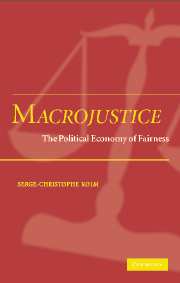Book contents
- Frontmatter
- Contents
- Presentation
- PART ONE BASES: CONSENSUS, FREEDOMS, AND CAPACITIES
- PART TWO OVERALL DISTRIBUTIVE JUSTICE: ELIE (EQUAL LABOUR INCOME EQUALIZATION)
- PART THREE COMPARISONS WITH POLICIES AND PHILOSOPHIES
- PART FOUR THE DEGREE OF COMMUNITY, EQUALITY, RECIPROCITY, AND SOLIDARITY
- 17 The degree of redistribution, solidarity, community, and reciprocity
- 18 Impartiality, consensus, and information
- 19 Disinterested judgments and the moral surplus
- 20 Communication and dialog
- 21 Impartialization to consensus
- PART FIVE COMPARISON WITH ECONOMICS' SOCIAL ETHICS
- References and bibliography
- Index
17 - The degree of redistribution, solidarity, community, and reciprocity
Published online by Cambridge University Press: 31 July 2009
- Frontmatter
- Contents
- Presentation
- PART ONE BASES: CONSENSUS, FREEDOMS, AND CAPACITIES
- PART TWO OVERALL DISTRIBUTIVE JUSTICE: ELIE (EQUAL LABOUR INCOME EQUALIZATION)
- PART THREE COMPARISONS WITH POLICIES AND PHILOSOPHIES
- PART FOUR THE DEGREE OF COMMUNITY, EQUALITY, RECIPROCITY, AND SOLIDARITY
- 17 The degree of redistribution, solidarity, community, and reciprocity
- 18 Impartiality, consensus, and information
- 19 Disinterested judgments and the moral surplus
- 20 Communication and dialog
- 21 Impartialization to consensus
- PART FIVE COMPARISON WITH ECONOMICS' SOCIAL ETHICS
- References and bibliography
- Index
Summary
IMPORTANCE AND METHOD
Place and general method
In the foregoing analysis, the distinction of issues and remarks about their relative importance, associated with principles of unanimity and impartiality (and hence, of the relevant equality), have led to the conclusion that global distribution should have a structure of equal labour income equalization (ELIE). Individuals should equally share their product of the same “equalization labour” k – obtained with their different given capacities. The corresponding distributive transfers should amount to the implementation of this principle. This equalization labour or coefficient k is rich in very important meanings: it turns out to be, for the considered society, a degree of redistribution (from full self-ownership); of income equalization; of solidarity for facing the unequal natural distribution of capacities; of community in rights to resources; of labour reciprocity (the redistribution amounts to each individual yielding to each other the product of the same labour, or to each owning this product of each other);of income compensation for lower productivity; and of decrease in disparities in individuals' total incomes. Coefficient k will also turn out to be the minimum guaranteed income for individuals not responsible for their low income, as a fraction of the average wage.
The determination of this coefficient k is shown in the present part of this study. This will complete the determination of the required global distribution, and hence also, in adding the other applications of basic rights, of macrojustice in society.
- Type
- Chapter
- Information
- MacrojusticeThe Political Economy of Fairness, pp. 279 - 297Publisher: Cambridge University PressPrint publication year: 2004



